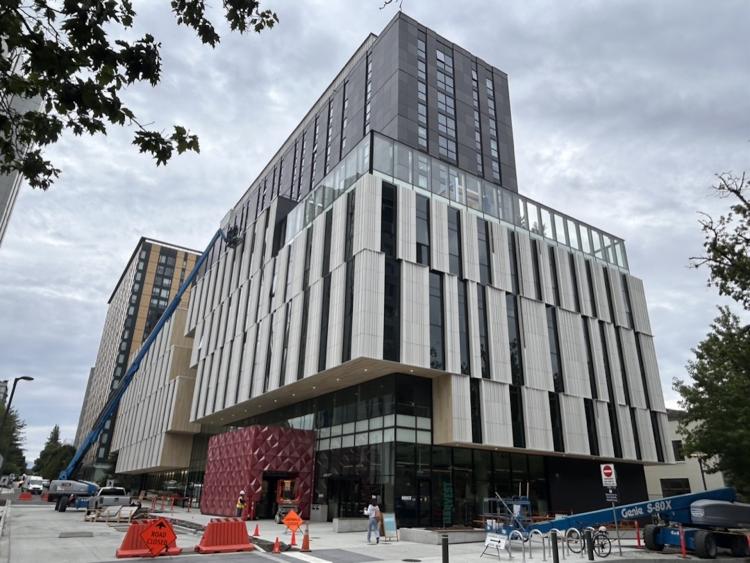The University of British Columbia has added another 282 beds to its Vancouver campus thanks to a new student residence building.
Brock South formally opened its doors to students earlier this summer. The building is already 100-per-cent occupied.

Photo credit: Matthew Ramsey/UBC Media Relations
"UBC is committed to providing living spaces on campus at below-market rates because we know the Greater Vancouver rental market is very challenging," says Andrew Parr, associate vice-president Student Housing and Community Services. "Brock South is the latest demonstration of that commitment."
Brock South features 16 four-bedroom suites, 212 studio units and six one-bedroom units. A room in a four-bed unit is $1,210.92 per month for a year-round contract, a one-bedroom unit is $1,673.19 per month and a studio is $1,463.28. All units are air conditioned.
"Living on campus provides not only financial, academic and social benefits for students, but the more residence spaces UBC builds, the less the pressure on the rental market in the broader community," adds Parr.
The opening of Brock South completes the multi-phase Brock Commons precinct, a mixed-use student housing project mainly for upper-year undergraduate and graduate students and academic development. The precinct includes three buildings Brock North, Brock South and Tallwood, and is located in the northern part of the campus near the Peter A. Allard School of Law.
Brock North opened in summer 2023 with 316 beds. The total cost of the North and South buildings was $165 million, consisting of 327,826 square feet of mixed-use space.
In addition to the 1,002 total beds in Brock Commons, the buildings include associated student support spaces and study spaces as well as two collegia. Academic and administrative areas include Faculty of Arts Academic Advising, legal clinic space for the Peter A. Allard School of Law, classrooms, and key offices for the Vice-President Students portfolio. Brock South includes new Hero Coffee and Harvest Market locations, enhancing food services to that area of campus for students, faculty and staff.
The buildings also feature a multi-purpose/multi-faith space, and two daycare centres (bringing the total number of child-care spaces across UBC's campuses to 850 from 813. UBC is among the largest child-care providers in B.C.
Designing the buildings to support multiple uses, from residence to child care, student services and food options, helps to build a vibrant community on campus, says Parr.
"The Brock Commons area is emerging as a key hub at UBC Vancouver," he says. "Not only is it close to transit, but the Aquatic Centre and the new Recreation Centre North, which opens in 2025, is nearby too. There's something for everyone."
New Brock South student resident and residence advisor Peter Pham, 22, says he was immediately impressed when he recently moved in.
"This is definitely at the top of the list of residences I've lived in," he says. "The air conditioning is a main attraction and has been a blessing this summer, and the location, which is close to the Bird Coop gym, is also great."
Pham, who is in his fifth year of biomechanical engineering studies and lived in Surrey with his family before moving to campus four years ago, said living at the university has dramatically improved his student experience.
"Before, when I was commuting on transit, it would take at least two hours each way," he says. "Now I can walk to class in 15 minutes. After I moved into residence, I have been able to use that time for my studies and exercise and being with friends. Living on campus has really opened up opportunities."
Pham's advice to any student considering living in student residence is to go for it.
"You can never go wrong," he said. "The rental market is volatile and the prices are unstable."
Since 2010 UBC has invested more than $700 million to build 6,080 new residence beds for students in Vancouver and in the Okanagan. The university is the largest university-run student housing provider in Canada with 16,003 beds (13,883 in Vancouver, 2,120 in the Okanagan) with a plan to build another 4,800 beds over the next 10 to 15 years.
This future growth would see 1,000 replacement beds (provided through upgrades and renovations of exiting residences), 3,300 new beds in Vancouver and another 500 new beds on the Okanagan campus. The first of these projects will be a graduate student-focused housing community, further enhancing graduate students' experience and success at UBC.












